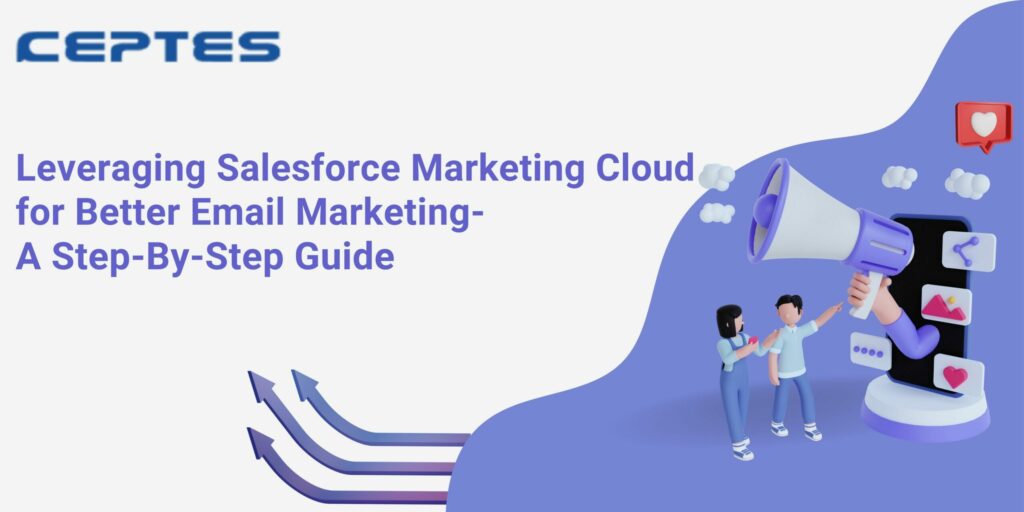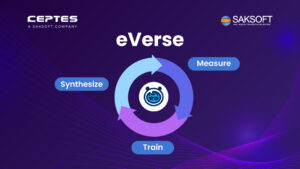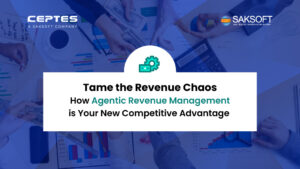Salesforce is one of the emerging CRM systems that is globally claimed as the #1 CRM, extending customer relationship management to businesses regardless of their size and operating field. In simpler terms, we can say that Salesforce helps businesses serve their customers better with tools to analyze customer data and automate sales and marketing processes.
Among the six major clouds introduced by Salesforce, which are leveraging businesses in countless ways, we will discuss one prime cloud in this article, the Marketing Cloud, and how to get benefited out of it more through Email Marketing.
Brief overview of Salesforce Marketing Cloud and its features
Salesforce Marketing Cloud is a highly robust and advanced marketing automation platform. It enables businesses to create and oversee customer journeys across multiple channels such as email, social media, mobile, web, etc. Let’s dive into a few prime features that Marketing Cloud is equipped with-
- Email marketing: Advanced and automated email marketing is the demand of the time, and Marketing cloud allows its users to set great email campaigns. These email campaigns can be set for personalized email campaigns, triggered email campaigns, and it also automates the email workflows. With tools and analytics marketing people can track their email campaign performances easily.
- Mobile Marketing: Understanding the popularity of mobile devices and the presence of a business in mobiles, this platform enables push notifications, SMS capabilities, etc. It allows businesses to connect better with their prospects and provide personalized services to their customers.
- Social Media Marketing: One of the prime marketing channels today is Social Channels. Marketing Cloud enables businesses to manage and schedule social media posts, monitor conversion, and engage with customers in real-time.
- Journey Builder: Journey Builder, this feature in Marketing Cloud enables businesses to create personalized customer journeys across multiple channels. It allows companies to deliver the right content/ message to customers at the right time.
- Data Management: The platform provides data management capabilities, including data segmentation, data cleansing, and data enrichment. These features help businesses to improve data quality and make more informed marketing decisions.
Setting up Salesforce Marketing Cloud for email marketing
Setting up Salesforce Marketing Cloud can be a little tricky task, let’s peep into the basic steps that one has to follow for setting up email marketing:
- Getting Marketing Cloud Access- First thing first, without having access to your Salesforce Marketing Cloud you can’t do anything. When you will kick-off your Salesforce Marketing Cloud Email Studio, you will receive a welcome email containing login instructions.
- Account Configuration & Security Setting- After accessing the platform, configure your account & security setting with the Marketing Cloud Setup Assistant. By this you get assurance that your account is perfectly settled-up, and your data is safe.
- Users & Roles Configuration- Next, you should configure user roles and permissions for your account. By configuring roles and users you can control your team-mate’s level of access at the same time allowing them to perform necessary tasks.
- Domain & IP setting configuration with Sender Authentication Package (SAP)– Sender Authentication Package (SAP) is a tool available in Marketing Cloud that helps you to customize your account branding. Use this tool to configure domain and IP settings, so that all your emails will get delivered into the inbox of the recipient rather than getting delivered into their spam folders.
- Securing Domain with SSL- You should also secure your domain with an SSL (Secure Sockets Layer) certificate to protect your customers by sharing secured links, images, email content, & CloudPages to build their confidence in your content.
- Importing Data- Once the account setting is done, you can import data into the Marketing Cloud including your subscribers list and other data as well. You can use manual methods or import tools for importing data into your Marketing Cloud.
- Creating Content in Marketing Cloud- Once you import your data into the Marketing Cloud, you are all set to create your content in Content Builder and Email Studio.
- Kick-off your First Email- Now you are all set to send your 1st email. Make sure to maintain the deliverability guidelines so that every mail you send hits the inbox of your wished recipient. This may involve configuring settings such as sender reputation, email authentication, and content quality.
- Develop a Comprehensive Marketing Strategy- At the end, the crucial thing is making sure that you develop a comprehensive email marketing strategy that aligns with your overall business goals. You can do it by defining your targeted audience, drafting personalized emails, and by measuring the campaign’s success-rate with analytics.
This architecture is a basic overview of the process flow for setting up your Salesforce Marketing Cloud email campaigns. You can dive deeper into each of the steps mentioned, and explore various features and tools available as per your campaign’s needs. Don’t miss out on checking the Trailblazer Community for more information.
Measuring success and optimizing email campaigns:
Several key factors are involved in measuring and optimizing email campaign success in Marketing Cloud. Let’s have a look at these steps-
- Setting up clear goals and objectives for the email campaign such as open rates, click-through rates, and conversion rates. It is the first step to measuring your campaign’s performance.
- Marketing Cloud enables tracking & reporting tools to monitor the performance of any campaign. Use these tools to determine your campaign’s key metrics for open rates, click-through rates, and conversion rates.
- Identifying trends & patterns is crucial to create more effective email campaigns. Analyze your data for validating the trends & patterns, and use this info to create data-driven campaigns and get the idea to optimize your campaigns.
- Test your subject lines, content, call-to-action buttons, and other elements of your campaign for determining what works best for your targeted audience/prospects.
- Refining and improving your email campaigns time-to-time based on your data & insights are advised for reaching your goals.
Summing- Up:
Email Marketing enables businesses to build strong relationships, establish credibility, and drive revenue growth. By adopting Marketing Cloud’s email marketing automation you can maximize the effectiveness of your email campaigns and drive better results for your business.
Are you still wondering how to use Marketing Cloud for email marketing or skeptical about the benefits it drives to your business??


















